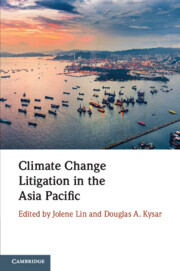Book contents
- Climate Change Litigation in the Asia Pacific
- Climate Change Litigation in the Asia Pacific
- Copyright page
- Contents
- Figures
- Tables
- Contributors
- Foreword
- Abbreviations
- Introduction
- Part I Theoretical Underpinnings and Implications of Climate Change Litigation
- 1 Uncommon Law: Judging in the Anthropocene
- 2 Networked Public Interest Litigation: A Novel Framework for Climate Claims?
- Part II International Law and International Adjudication
- Part III Domestic Law and Domestic Adjudication
- Part IV China, Courts and Climate Change
- Index
1 - Uncommon Law: Judging in the Anthropocene
from Part I - Theoretical Underpinnings and Implications of Climate Change Litigation
Published online by Cambridge University Press: 06 November 2020
- Climate Change Litigation in the Asia Pacific
- Climate Change Litigation in the Asia Pacific
- Copyright page
- Contents
- Figures
- Tables
- Contributors
- Foreword
- Abbreviations
- Introduction
- Part I Theoretical Underpinnings and Implications of Climate Change Litigation
- 1 Uncommon Law: Judging in the Anthropocene
- 2 Networked Public Interest Litigation: A Novel Framework for Climate Claims?
- Part II International Law and International Adjudication
- Part III Domestic Law and Domestic Adjudication
- Part IV China, Courts and Climate Change
- Index
Summary
The origin story of environmental law begins with judges working valiantly to protect the environment, but ultimately, out of an apparent necessity, passing responsibility to legislators and regulators. There is truth to the story, but it ignores important aspects of the demonstrated expertise, creativity, and dynamism of common law judges. Given the trajectory of the environmental law narrative, judges today too anxiously defer to legislative and regulatory policy, and we have come to expect and sometimes champion, this shirking of environmental responsibility.The logic of judicial deference is unpersuasive in an age where legislators and regulators also struggle to address environmental issues like climate change. This chapter urges that, instead of minimizing the role of judges, there is immense need to rediscover the possibilities of common law and other judge-made tools of environmental protection. There is need to write a new origin story in which courts, legislators, and regulators carry shared responsibility.
- Type
- Chapter
- Information
- Climate Change Litigation in the Asia Pacific , pp. 15 - 37Publisher: Cambridge University PressPrint publication year: 2020
- 3
- Cited by



